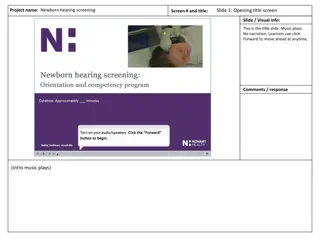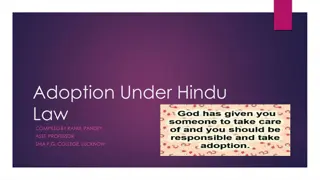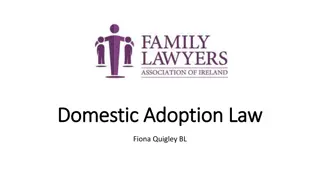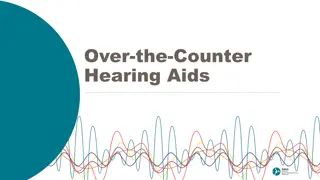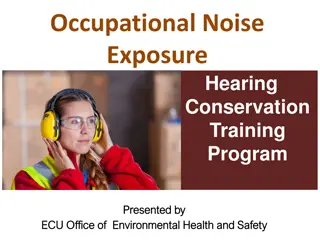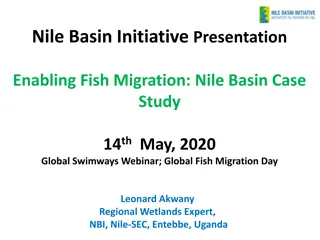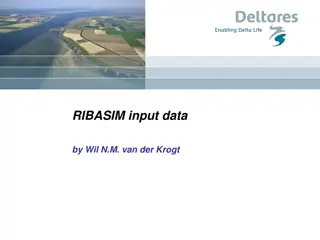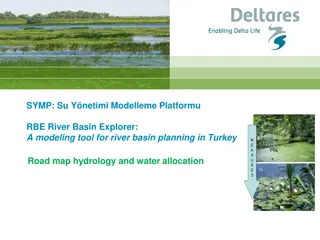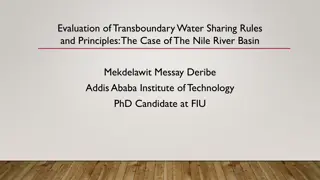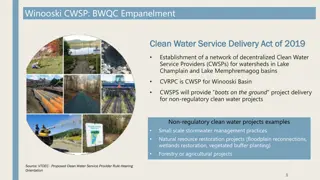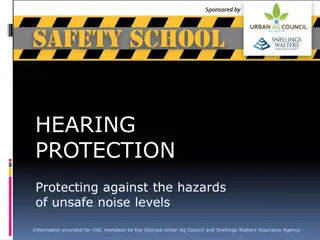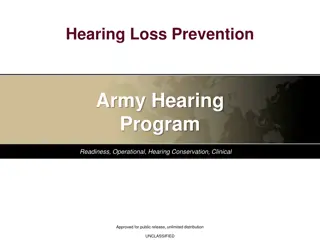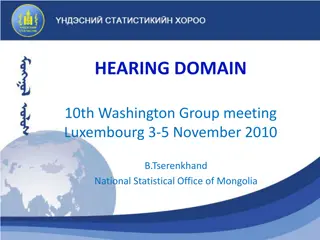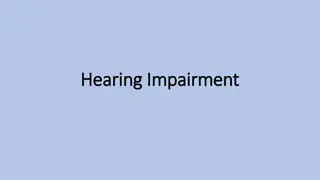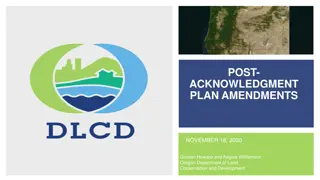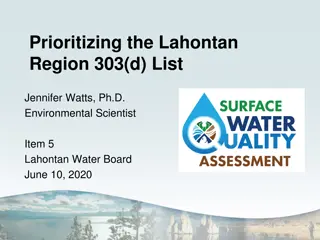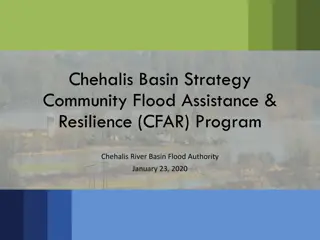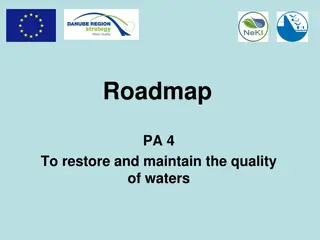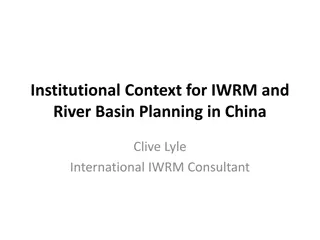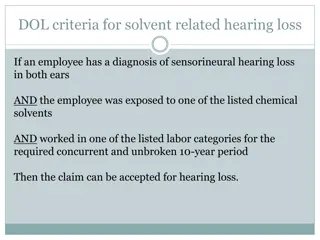Lahontan Water Board Basin Plan Amendments Adoption Hearing
The Lahontan Water Board held a meeting on April 9, 2014, to discuss amendments to the Basin Plan. Key updates included clarifying antidegradation policies, expanding mixing zones, addressing prohibitions, and exemptions for low-threat discharges. Significant revisions were made to the Lake Tahoe chapter to align with current regulatory standards.
Download Presentation

Please find below an Image/Link to download the presentation.
The content on the website is provided AS IS for your information and personal use only. It may not be sold, licensed, or shared on other websites without obtaining consent from the author.If you encounter any issues during the download, it is possible that the publisher has removed the file from their server.
You are allowed to download the files provided on this website for personal or commercial use, subject to the condition that they are used lawfully. All files are the property of their respective owners.
The content on the website is provided AS IS for your information and personal use only. It may not be sold, licensed, or shared on other websites without obtaining consent from the author.
E N D
Presentation Transcript
BASIN PLAN AMENDMENTS ADOPTION HEARING Item 2 Water Board Meeting of April 9, 2014 Chuck Curtis and Robert Larsen Lahontan Water Board
Basin Plan Status Last major revision 1994 Many potential changes identified, including opportunities to: Streamline application of regulations Provide Board flexibility Improve clarity and consistency 2
Amendments to Update/Clarify Address antidegradation policy inconsistencies Add mixing zone provisions Clarify prohibitions and exemptions Revise Lake Tahoe chapter Update outdated policy references Correct errata 3
Antidegradation Policy Current reference to nondegradation is undefined Change reference from Nondegradation Objective to Antidegradation Policy 4
Mixing Zones Acknowledge State Board policy Expand mixing zones to include Non-Federal Waters Groundwaters Constituents not covered by State Water Board policy 5
Prohibitions and Exemptions Add prohibition on unauthorized discharges Provide exemption criteria for regionwide and area-specific prohibitions Allow Board to grant exemptions to most prohibitions Give flexibility to allow certain discharges Eliminate inconsistent application of prohibitions 6
Low Threat Discharge Prohibition Exemptions Atmospheric condensate Water system testing Water system flushing Testing w/ potable water Foundation drains Incidental landscape runoff Non-contact cooling water Aquifer/pump testing Treated groundwater Construction dewatering Utility vault flushing Pier pilings Buoys and navigation aids Scientific instrumentation 7
Lake Tahoe Chapter Revisions Significant revision to remove most TRPA-related regulations and discussion Update to reflect current regulatory environment Prohibition and exemption language amended for consistency and clarity 8
California Environmental Quality Act Substitute Environmental Document Items with no potential adverse impact Non/anti-degradation edits Pesticide prohibition clarification Chapter 5 (Lake Tahoe) amendments Errata correction and policy reference updates 9
California Environmental Quality Act Mixing zone implementation conditions protect environment Small as practicable Not compromise water body integrity or overlap with other mixing zones Not be located near any drinking water intake Not adversely impact habitat Not cause a nuisance or produce objectionable odor, color, taste, turbidity, or toxicity 10
California Environmental Quality Act Prohibition exemption criteria protect the environment No adverse impact to beneficial uses No reasonable alternative to the discharge Applicable BMPs and mitigation measures must be incorporated 11
Public Comments David Shaw for Squaw Valley Ski Holdings Use geomorphic floodplain vs. mapped 100-year floodplain Response: Mapped 100-year floodplain is appropriate to protect 12
Public Comments (cont.) Tahoe Water Supplier Association Don t allow pesticides in Lake Tahoe, protect ONRW Response: 2011 amendments provide Board flexibility to allow such discharges under strict conditions; this action only changes who may be apply and does not approve any specific project. Require other methods first. Response: 2011 amendments require non-chemical methods be assessed first. 13
Public Comments (cont.) Victor Valley Wastewater Reclamation Authority Relative impacts of solar drying beds for biosolids dewatering need to be considered. Response: Agreed. Impacts from solar drying beds likely to by insignificant compared to other discharges. Response: Impacts depend on case-specific conditions. VVWRA has lined beds. 14
Public Comments (cont.) Victor Valley Wastewater Reclamation Authority (cont.) Amendment language specifies manner of compliance. Response: Language is advisory. Modify language to consider relative impacts to groundwater. Response: Language modified to recommend liner or mechanical dewatering. 15
Public Comments (cont.) William Thomas Many substantive changes w/ limited review and discussion. Response: Most changes are editorial or update State Board policies. Response: Mixing zone and prohibition changes could be considered substantive. 16
Public Comments (cont.) William Thomas (cont.) Response: Significant review and opportunity for public and agency input: Scoping January through March 2013 included draft amendment language. Workshops at Board meetings February, March, November 2013. Public review of proposed amendments since January 27, 2014. 17
Public Comments (cont.) William Thomas (cont.) Fecal coliform objective should be added to these amendments. A program is in place to evaluate potential revision of Lahontan s objective: review objective, bacteria data, new USEPA criteria, and proposed State Board bacteria objective. Adding new bacteria objective now would require new CEQA analysis and recirculation. 18
Recommendation Approve the Resolution Certify the Environmental Document Adopt the proposed Amendments 19
Next Steps Finalize Administrative Record Submit to State Board for approval Office of Administrative Law approval USEPA approval of provisions considered standards 20


